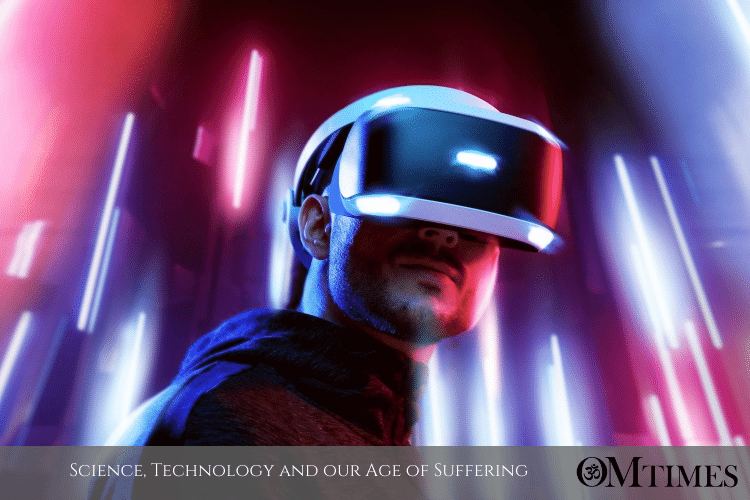Science, Technology and our Age of Suffering

Nothing has changed our suffering more than science. Nothing. Sorry Buddha, sorry Vedanta, sorry Christianity. Although you’ve all been a big help, you need to kneel to science (and its stepchild; technology) as the biggest branch of human endeavor to affect our relationship to suffering.
Both ways. Good and bad. More and less.
The Modern Age – the Age of Suffering
By William Arntz
Until 200 years ago, one of the biggest causes of death was starvation and malnutrition. Then came internal combustion engines, tractors, harvesters, plant breeding, genetic modification, chemical fertilizers, pesticides, and Monsanto. In the mechanized world, starvation was kicked way down on the list. Of course, in the headlong plunge to feed everyone (good), science has all but wiped out biodiversity in food crops and poisoned the ecosystem (bad).
Meanwhile we[1] today live better than the kings and queens of the past. Back in the 15th century, the royalty lived in cold stone castles with a modicum of heat supplied by burning an inordinate amount of wood. They had no running water. A hot bath was a rare undertaking. And let’s hope you didn’t kick over the chamber pot in the middle of the night. Your dentist would have been a blacksmith, and your dinner was frequently rotten with maggots crawling out of the not-so prime rib.[2] And that was the situation for royalty! As for the rest of the population, it was considered a luxury if you had a pig to sleep next to at night to keep you warm.
The level of personal comfort, convenience, health care, diet for the average citizen today would make the queens and kings of an old quake in their itchy wool undergarments in wonder and envy. Science has delivered us from the gross levels of suffering, allowing us to … what? Suffer in more creative ways? Like from a Facebook post?
The Dark Side of Modern Convenience
Modern warfare now mows down people, buildings, cities, forests, and cultures with the touch of a button. Modern travel and communications flatten time-honored societal mores, customs, and conventions with a click of the mouse. The community of old which provided a safety net for members in the community is now shattered by globalization.
Our relationship to ourselves, to others, to groups, to ideologies, has all shifted in the past 20 years with the Internet explosion. Eight-year-old kids see things on YouTube that they have neither the mental or emotional maturity to handle.
Of course, we can’t blame science and technology, per se. For there are people behind this who for their own personal gain, create the weapons, the manipulation, the destabilization, and from its profit greatly. But much of the damage done is not due to nefarious goals or greed. It is due to the unintended effects of a complex system gone wild.
“The Sorcerer’s Apprentice,” is a poem by Johann von Goethe, popularized by the Disney cartoon in Fantasia. Mickey Mouse is an apprentice to a sorcerer who has a magic wand that makes inanimate objects move (hello robotic AI). The sorcerer leaves and gives Mickey the task of cleaning up. Mickey takes the wand and gets the buckets and brooms to do what he doesn’t want to do. And they do. And do. And do some more and more and … it’s a runaway disaster with buckets of never-ending water sloshing everywhere until the sorcerer comes back and shuts it down.
And that’s where we are with technology. (Except no sorcerer is waiting in the wings to say “Stop!”) We are creating devices, modes of communications, social interactions and artificial intelligence about which we have no idea of the ramifications, thereby creating ever new and odious ways to suffer.
And yet, at the same time, we have an industrialized world largely devoid of those base ills (food, shelter, survival) that caused us to suffer for eons.
The Promise [and Worldview]
Science & Technology (SciTech) promises to be the answer to our problems. And this is not without reason. The success with which science and technology have come to an understanding of the universe predicted events and delivered amazing solutions for a myriad of problems have led us to think that in time SciTech will solve them all.
For example, when I tell people that I have a bad case of tinnitus (ringing in the ears), they are dumbfounded when I sadly report that there’s nothing to be done about it. When it first happened to me, I was dumbfounded that there’s nothing to be done to fix it. Like everyone else, I figured that the medical community had done the research, experiments, case studies, and clinical trials and formulated a cure for this maddening condition.
In fact, this belief that science will save us is the predominant religion of today. Saving used to be the realm of the spiritual, but those days are over. Our society believes that if there is a problem, science has, or will, fix it, heal it, or deliver us from it.
This is so prominent it is now the overriding worldview of our time.
And while we think SciTech is the answer, it clearly is not. Science and Technology have made our standard of living and ease of living much much better. Yet look at our world. Wars keep on erupting, cancer is epidemic, mental illness and opioid addiction are rampant, and suicide is at an all-time high and rising. We have traded the older physical modes of suffering for a new age of emotional, mental and spiritual modes of suffering. How strange. Eliminate one form of human suffering and suffering just pops up on another level. There must be something more basic going on. Something more basic than the world out there that we manipulate to make life better.
[1] Speaking of the “developed” countries.
[2] Food could be so foul that black pepper, used to preserve food and/or hide the taste, was more valuable than gold.
Click HERE to Connect with your Daily Horoscope on OMTimes!
You will also enjoy Rupert Sheldrake – Science and Spiritual Practices
About the Author
William Arntz began his professional career as a research laser physicist, developing wave optics simulators for the high energy lasing systems that became the “Star Wars” strategic defense system. He then left the scientific world and spent 20 years studying with two spiritual teachers. During that time, he wrote the system management software product, AutoSys, and sold the company for millions. Following his lifelong passion for filmmaking, he used the proceeds from that to produce, direct and write the film What the BLEEP Do We Know!? incorporating his scientific background, spiritual training, and a desire to make people laugh and think.
OMTimes Magazine is one of the leading on-line content providers of positivity, wellness and personal empowerment. OMTimes Magazine - Co-Creating a More Conscious Reality




